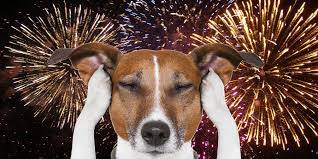Fireworks aren't everything Oohs! and ahhh! for dogs. Learn why most dogs don't like fireworks and what you can do to make them more comfortable.
Dogs and fireworks just don't mix. There are some times of
the year when people celebrate, but dogs just want to run and hide - like the
4th of July and New Year's Eve. If you have a dog that can't stand the loud
noise of fireworks, you already know that these two holidays aren't always fun
and entertaining. But knowing why dogs are afraid of fireworks can ease your
dog's nerves.
Dogs have excellent hearing and have evolved to be sensitive
to new sounds. When they hear something scary or strange (like fireworks or
thunder), their instincts tell them to run and find safety. That's why human
parties that include fireworks aren't fun for most dogs. The good news is that
there are ways to help your dog find comfort when these holidays happen each
year.
Why Are Dogs Afraid of Fireworks?
Some happy people report that their dog grows up and doesn't
seem to have problems with fireworks or thunder. But many dog parents find
that their dogs find squeaks, cracks, and squeaks awful.
Dogs experience their world primarily through their senses,
and they can pick up sounds and smells from great distances. They thrive in
environments that are predictable (fireworks are anything but), and when
something is new or strange, they don't always have the skills to handle it.
This means your instincts kick in and you may see all sorts of behaviors such
as:
• Barking
• complaint
• Skirt
• Stimulation
• Vibration
• Cowards
Left alone to deal with their emotions, dogs can experience
intense fear or panic, leading to behaviors such as running away from the
fenced yard, destructive chewing, potty problems, excessive licking or licking,
and even biting when forced to interact with others. communicate.
4 Tips to Ease Your Dog’s Stress During Fireworks
It is important to remember that every dog is an individual.
You will need patience and understanding as you discover what works for your
firecracker dog. Don't be afraid to experiment with different methods to find
the best solutions for your canine friend. And remember: always keep your dog
inside and away from fireworks, and make sure his ID tags and microchip are up
to date.
1.
Create a Safe Place
Every dog should have access to a safe space in their home
where they can retreat whenever they want. It could be his kennel (if he likes
it), an empty bedroom or office, or even a warm bathroom. Place things in a
safe place that your dog likes, such as a favorite toy or blanket. While he is
there, make sure no one disturbs him or forces him to leave.
2. Stay
With Your Dog and Provide Comfort
Many owners feel that they should not comfort a frightened
dog because it will make the situation worse. This is simply not true.
Comforting your dog when he is scared ensures that you are there to help. Just
as you would comfort a crying child, you should comfort a frightened dog. Your
comforting presence combined with slow and quiet pets can help your friend feel
safe.
3.
Distract Your Dog With Toys and Treats
If you know fireworks are on the agenda, distract your dog
before they start by giving him a great toy full of treats or engaging him in
some good poke games. Encourage him to chew on a favorite paw or do some fun
exercises. After the fireworks go off, give him something to chew or lick, such
as a KONG toy filled with mummies or even a bowl of treats and ice cubes.
4. Play
White Noise
Some dogs like soft sounds like the sound of a fan or just
the sound of a television. You can try playing soft classical music or even buy
a white noise machine designed for dogs. Be sure to turn them on before the
bars start and keep them on until the noise goes away.
Should You Medicate a Dog That's Scared of Fireworks?
If your dog is overwhelmed with stress and anxiety and you
just can't help it, don't be afraid to seek help from a veterinarian or a
behavioral veterinarian. They may suggest giving your dog a prescription
medication before the holiday season. You can also try over-the-counter options
like Composure Treats or Adaptil. Make sure that whatever you try is done with
the help of a professional and in conjunction with a positive
reinforcement-based plan that includes desensitization and counterconditioning.




0 Comments